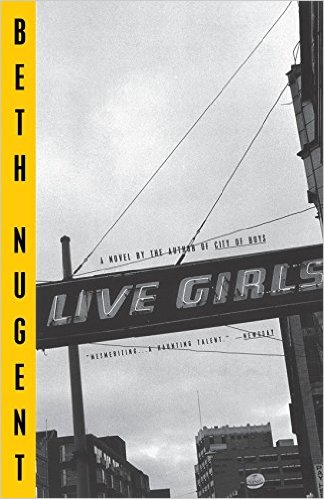Writers Read: Live Girls by Beth Nugent
 Live Girls by Beth Nugent is the story of Catherine, twenty-years-old, who abandons her first year of college at a women’s religious university, moves to the nearby city where she takes up residence at a seedy transient hotel, and accepts a job as a ticket seller in a squalid, decaying porn theatre. Catherine is pretty, curiously reserved, and certainly strange, as if she harbors a secret. And she does: she had a younger sister whose face was covered in ropy pink scars from a steam vaporizer over-turning in her crib. Growing up, the sister (whose name we never learn) quietly tortured Catherine out of envy, rage, and disgust for her own existence. The parents, ineffectual and shell-shocked, did little to alleviate the situation, and the girls were left to their own devices. Catherine neither learned to fight back nor be confrontational. Instead, we witness her react to her murky surroundings.
Live Girls by Beth Nugent is the story of Catherine, twenty-years-old, who abandons her first year of college at a women’s religious university, moves to the nearby city where she takes up residence at a seedy transient hotel, and accepts a job as a ticket seller in a squalid, decaying porn theatre. Catherine is pretty, curiously reserved, and certainly strange, as if she harbors a secret. And she does: she had a younger sister whose face was covered in ropy pink scars from a steam vaporizer over-turning in her crib. Growing up, the sister (whose name we never learn) quietly tortured Catherine out of envy, rage, and disgust for her own existence. The parents, ineffectual and shell-shocked, did little to alleviate the situation, and the girls were left to their own devices. Catherine neither learned to fight back nor be confrontational. Instead, we witness her react to her murky surroundings.
Catherine’s boss, Dave, the owner of the theater, happened to have killed his wife, though it was an accident. Adamant that Catherine is too pretty and has too much class to be working there, he offers her some ‘options’ by setting her up with his nephew, Danny: beefy, geeky, socially inept. Danny kills pigeons for the city, and he can’t dress. Catherine slowly becomes a pressure cooker about to burst, increasingly haunted by vivid memories, and the ghost of her sister. A few months after Catherine left for college, the sister had set herself on fire in her own bed and killed herself.
What affected me most about this book was its tone. It was subversive and pitch-perfect throughout; swirling through its bleakness was laugh-out-loud humor. This humor is primarily filtered through Catherine’s unexpected friendship with a snippy, regal transvestite named Jerome, who is anorexic and constantly covered in bruises from the beatings by the sailors from his nightly romps. Nugent is relentless in offering us the despair of these pitiable transients who can’t get their lives together, and would not know what to do with them if they could. But the distance at which she remains, narrating via Catherine’s razor-sharp first-person POV, is skillful, astute, and funny. Sentences reach out and grab you, then caress, leaving a trace of poison before darting back into the dark. If Carr, Ginsberg, Burroughs, and Kerouac had been women, this is probably what they would have written. Take the opening:
“My sister never slept. This is what she always told me: she never slept; she never had a dream; she never thought of me. Any of it could have been true. I never saw her sleep. When we were children, she moved around our room at night like an animal in the dark, a creeping little thing, stealing from shadow to shadow. She was like a shadow herself as I watched her through half-closed eyes, a moving patch of fluid darkness. Some nights, I woke to find her beside my bed, her hand on my face, brushing softly over my skin like the hand of a blind person…I longed to open my eyes to look at her, but at even the slightest motion she pulled her hand back and retreated into the darkness” (3).
Later in the book: “My heart is a moth, beating against the walls of my chest. My throat is a moth; my brain is a ball of spiders,  moving, walking; a ball of moving spiders moving” (23). Nugent uses the word ‘moving’ three times, a provocative word for a story where basically nothing moves at all.
moving, walking; a ball of moving spiders moving” (23). Nugent uses the word ‘moving’ three times, a provocative word for a story where basically nothing moves at all.
This book influenced my own work because it has encouraged me not to fear the subversive: don’t dread the desire to let my writing be a little like Mrs. Lovett’s Meat Pies. Don’t shy away from uncomfortable terrain. There is some rich, deep mining to be done in the darker parts of the cave. The trick, as it were, is to make it accessible, and in some way, cathartic. How can a writer be truthful and set a dark heart on fire, and while watching it burn, toast marshmallows with his or her readers so as to transcend the pain into something more palatable? These are questions that writers must explore, experiments to try out, observing the bright, little sparks that pop in the wicked dark. Yes, eventually Catherine escapes—stealing a neighbor’s dying cat and stringing Jerome along on the veiled promise that they are going all the way to Hollywood so he can become a star. To say any more would spoil the ending.
Nugent serves up dishes born of other ingredients of the American Dream: the bland broth of our economy, the empty bread bowl of the job market, and the bacony ways that beautiful young women are devoured by men in America. At its core, Live Girls is a slow-burn fever-dream about guilt and how it parasitically devours an innocent heart. It turns out that Nugent’s cavernous debut holds more relevance now than it ever did twenty years ago when it was originally published. These are strange and shady times, and Catherine is a weirdly apropos anti-heroine for those who, though they want to, can’t quite figure out the right way through.
Nugent, Beth. Live Girls. Knopf, 1996.
 Tim Cummings is currently an MFA Candidate in Writing for Young People at Antioch University Los Angeles and holds a BFA in Acting from New York University’s Tisch School of the Arts. He admires the works of Philip Pullman, Patrick Ness, Madeleine L’Engle, Richard Adams, Beth Nugent, and Joan Didion. He is the recipient of several major performance distinctions, including two Los Angeles Drama Critics Circle Awards for Best Lead Actor and Best Ensemble Performance. He has been the Associate Director of the Youth Workshop for the Ojai Playwrights Conference since 2010.
Tim Cummings is currently an MFA Candidate in Writing for Young People at Antioch University Los Angeles and holds a BFA in Acting from New York University’s Tisch School of the Arts. He admires the works of Philip Pullman, Patrick Ness, Madeleine L’Engle, Richard Adams, Beth Nugent, and Joan Didion. He is the recipient of several major performance distinctions, including two Los Angeles Drama Critics Circle Awards for Best Lead Actor and Best Ensemble Performance. He has been the Associate Director of the Youth Workshop for the Ojai Playwrights Conference since 2010.





